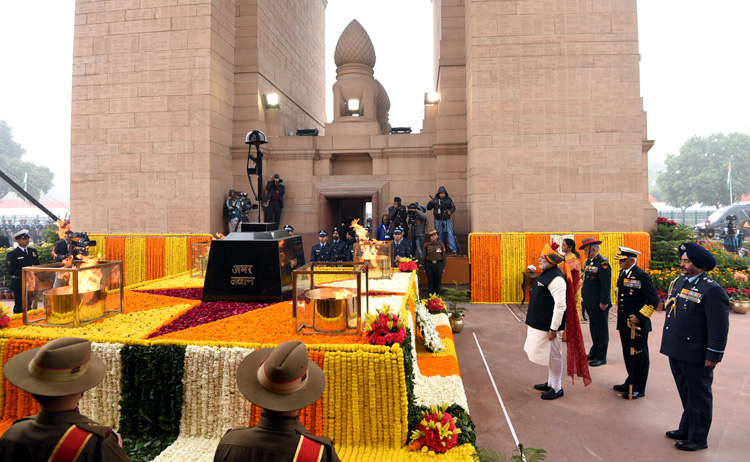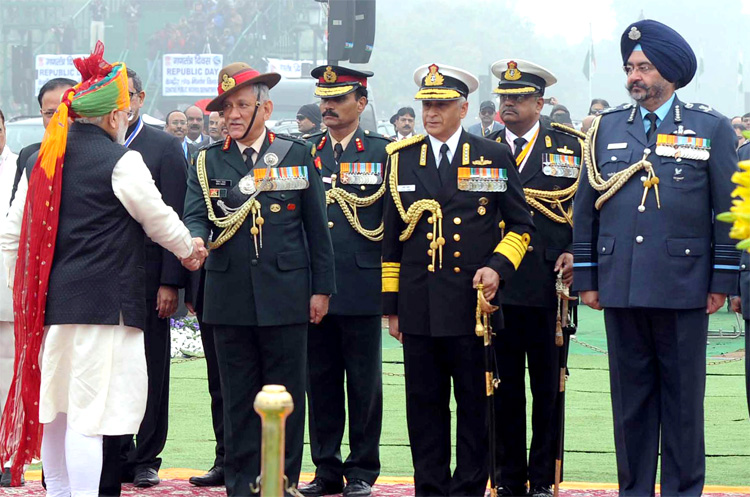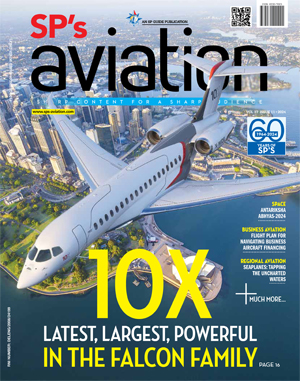INDIAN ARMED FORCES CHIEFS ON OUR RELENTLESS AND FOCUSED PUBLISHING EFFORTS

The insightful articles, inspiring narrations and analytical perspectives presented by the Editorial Team, establish an alluring connect with the reader. My compliments and best wishes to SP Guide Publications.

"Over the past 60 years, the growth of SP Guide Publications has mirrored the rising stature of Indian Navy. Its well-researched and informative magazines on Defence and Aerospace sector have served to shape an educated opinion of our military personnel, policy makers and the public alike. I wish SP's Publication team continued success, fair winds and following seas in all future endeavour!"

Since, its inception in 1964, SP Guide Publications has consistently demonstrated commitment to high-quality journalism in the aerospace and defence sectors, earning a well-deserved reputation as Asia's largest media house in this domain. I wish SP Guide Publications continued success in its pursuit of excellence.
New Tri-Service Divisions
 |
The Author is Former Director General of Information Systems and A Special Forces Veteran, Indian Army |

Going by media reports, the MoD is finally moving ahead to approve creation of Tri-Service organizations to handle cyberspace, space and special operations. Quoting unnamed government sources, the news says “at least two, if not three” of these three organizations will soon be approved by the Cabinet Committee on Security (CCS) led by Prime Minister Narendra Modi. The logic why “at least two, if not three” of these three organizations being approved which have been hanging fire for years is not difficult to gauge with the laid back attitude that MoD has been displaying in matters military. In fact, the only pressure likely will be to announce something before elections. If only two organizations are to be approved, possibly the one dealing with special operations may be left out for later date, because government has shown little stomach for special operations beyond the Special Forces raid on multiple terrorist launch pads in POK (named ‘surgical’ strikes) during September 2016 despite escalation of violence in J&K having gone up exponentially after the surgical strikes with increased loss of lives of security forces.
The Defence Space Agency is envisaged to bring together the existing Defence Imaging and Analysis Centre located at Delhi and the Defence Satellite Control Centre at Bhopal. The Defence Information Assurance and research Agency (DIARA) under HQ Integrated Defence Staff (IDS) is to be upgraded into the Defence Cyber Agency. The government-appointed Naresh Chandra Committee, tasked to suggest ways to revamp defence management, had submitted its report to the government on August 8, 2012. The recommendations included setting up three Commands; for space, cyberspace, and for special operations. MoD’s response then was that these should not be Commands, but Divisions.

Apparently, the bureaucrats had visions of these Commands being as large as an Army Command. But that these have still not been approved by the CCS full six years after government received the recommendations shows how defence issues are treated in India, be it UPA II or NDA II. This is despite China’s considerable prowess in cyberspace and space. As for special operations, India has continuing asymmetrical disadvantage in proactive special operations in the sub-conventional segment of conflict. The irony is the knee-jerk approach that has become routine in India, be it matters military, foreign policy or whatever, recent incidence of first accepting Imran Khan’s offer for foreign ministers meet at New York and then rejecting it being one small example. Despite facing increasing threats on our borders, we have only two integrated commands: Andaman and Nicobar Command (ANC) established in 2001 and the Strategic Forces Command (SFC) established in 2003. Even though the proposed Defence Cyber Agency, Defence Space Agency and Special Operations Division are yet to be approved by the CCS, apparently the urgency for the three Services to integrate seamlessly is not felt at all. It is pathetic to see comments in media that if the present government continues for another 20 years then such integration would become reality. Not that one can blame the public when the government itself is content with a laidback approach. Despite more than four years in office, government has made no move to reorganize the Ministry of Defence (MoD), which only required merging the HQ Integrated Defence Staff with it. Our MoD continues to enjoy the dubious distinction of being manned solely be bureaucrats who have a stranglehold on the politicians no matter which party. India has had scores of defence scams but no bureaucrat of MoD has ever been even questioned, leave aside prosecution despite the Defence Secretary / DG Acquisition signing every deal. Notably, in the current fracas over Rafale while the Defence Minister is going overboard with announcements and serving Air Force officers have been roped in to defend the deal, there has not been a single statement by the Defence Secretary who significantly is officially charged with defence of India instead of the Defence Minister. Ironically, the Modi government has made no effort to rectify even this anomaly. When General VK Singh, now MoS (External Affairs) wrote in his autography that the “pipeline” goes right up to the PMO, governments have traditionally used defence ministers to collect money for political parties. The message conveyed to the general public is that the Services keep fighting amongst each other and do not want to integrate. This despite Service Chiefs confirming to then Defence Minister Pranab Mukherjee in October 2005 that they all want a Chief of Defence Staff (CDS) with full operational powers. But it suits the bureaucracy nexus to keep the Services apart, while political authority couldn’t care less. Same goes for Theatre Commands, which had been studied in detail 13 years back after five studies ordered by HQ IDS were presented at DGMO and equivalent level and appreciated by all giving out how the 17 single commands of the Services should be reorganized into Tri-Service/Bi-Service Integrated Theatre Commands (ITC) and Integrated Functional Commands (IFC).
The trick by successive governments has been to make periodic noises or order another study. Defence Cyber Agency and Defence Space Agency are likely to be approved first but it is question of how soon they will come into the required form. More importantly, how much they will be integrated at the national level is questionable since Indian governments traditionally keep the military compartmentalized separately, unlike the US and China where say the Cyber Warfare Programs are led by respective militaries.
As to the Special Operations Division, India needs special operations organized at two levels:
- one, under the Prime Minister for employment at strategic level for politico-military missions, and;
- two, as force multipliers for military operations. The Special Operations Division would meet the latter requirement.





